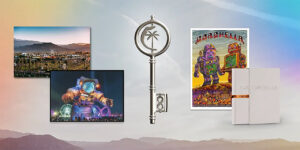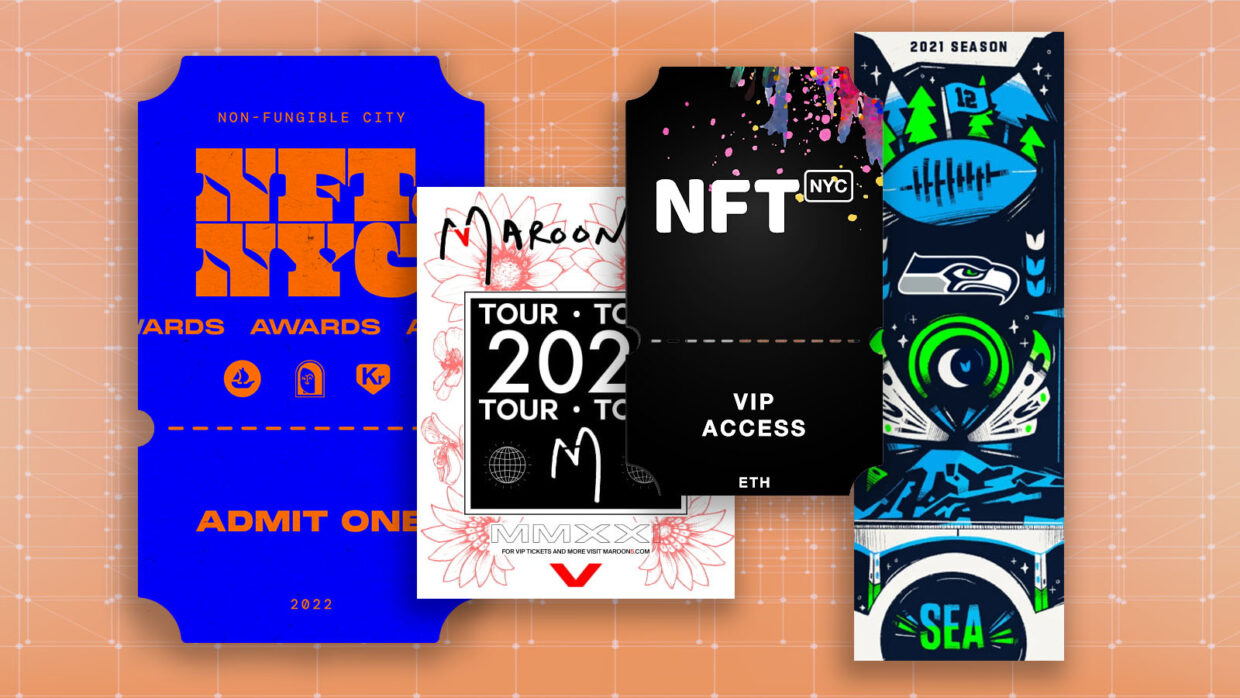Ticketmaster, the major sales and distribution company that holds more than half of the ticketing market share, recently announced a partnership with Flow, enabling event organizers to issue NFTs connected to tickets and tied to the blockchain. The ticketing giant’s move onto the blockchain gives a major boost to the NFT ticketing space, though, by all signs, the sector is not just fledging, but fast-growing.
Since its introduction in 2020, aided by startups like GUTS Tickets, NFT ticketing has touched major events like New York Fashion Week and live events from music festivals to comedy shows. Companies like oveit and Amsterdam-based GET Protocol are billing themselves as comprehensive ticketing solutions for “the modern web,” while NFT ticketing platforms like YellowHeart are zeroing in on music and entertainment industries, and finding success in partnerships with groups like Kings of Leon, Maroon 5, and XXXtentacion.
The inclusion of NFTs in the ticketing space promises a change in the way that tickets will be sold, bought, and reissued, with NFT ticket holders vying to gain access not only to events, but for the additional perks not limited to post-event swag, royalty rewards, or even lifelong access.
What is NFT ticketing?
In a sentence, it’s the usage of NFTs as tickets, with holders being able to access events. This differs from virtual tickets, Proof of Attendance Protocol (POAPs), and from non-POAP NFTs issued post-event as collectible items.
Virtual tickets are simply electronically issued tickets. Companies like Eventbrite and SignUpGenius manage these signups, sending tickets to users directly. POAP tokens are collectible NFTs that simply serve as “digital proof” the collector attended an event, and are usually only issued after the event occurred. NFTs issued post-event, like the NFL’s 2021 season NFT release, aren’t usable as tickets, just memorabilia.
Tokenized ticketing and live music

In April, Coachella dropped its Keys Collection, which granted holders perks such as lifetime access to the festival and front row views. Image: Coachella
Live music events and festivals have made up most of the high-profile use cases of NFT ticketing. Chief among them: Coachella Valley Music and Arts Festival. For its 2022 edition in April, the festival released a limited edition of 10 NFTs as part of its Keys Collection, guaranteeing a few holders lifetime access to the festival, front row views, a celebrity chef dinner, and future perks that are yet unknown. The idea took well — not only has Coachella never offered lifetime passes, this was also its first NFT drop — and one of the Keys NFTs, the Infinity Key, sold for about $270,000, with the full collection fetching $1,474,000.
Benefits of blockchain-based ticketing

New York Fashion Week has invited brands and designers to create “Keys” that could be purchased to unlock experiences at the event. Image: Afterpay
TicketMint, a NFT ticket minting company, sees two major problems with the ticketing industry: ticket fraud and third-party scalping. But because NFT tickets are minted, all transactions are recorded on the blockchain, making it clear when and where the ticket was bought — ticket authenticity becomes indisputable.
NFT smart contracts (programs that execute tasks when certain conditions are met) can manage ticket prices and ensure that no user can buy more than a specific number of tickets. Ticket prices can be capped and regulated with smart contracts, and royalties from secondary and tertiary ticket sales can also be managed, evenly dividing up payment amounts.
Lastly, NFT tickets can connect groups and organizers directly to their audiences. Outside of external factors like scalpers, one of the major and long-surfaced issues with the ticketing industry are the high fees associated with purchases. Fees on sites like Ticketmaster, for example, can amount to as much as 78 percent of the ticket’s face value, with a vast majority of tickets being held for the secondary market and with markups ranging from 50 to 7,000 percent. With tokenized ticketing, organizers can potentially offer attendees direct access to events, while building for them a better fan experience.
The future for NFT ticketing
Chiefly, the emergence of NFT ticketing might see less monopolization within the ticketing industry. That Ticketmaster is moving into the space signals the attractive prospect of blockchain-based ticketing to consumers, as much as the threat that NFT ticketing could pose to long-dominant intermediaries. With smaller companies specializing in improving and providing more specific NFT ticketing transactions, the competitive rates of smaller ticket issuers will give them the competitive advantage.
However, there’s also a scalability issue: the growth of NFT ticketing might struggle as the barrier of entry into the NFT world remains. To hold and purchase NFTs, one needs to set up a wallet, which can prove to be both confusing and difficult. Further, there seems to be an increasing disillusionment with the world of crypto. According to recent findings by Pew Research Center, about half of Americans have heard of NFTs, but only 4 percent have bought token. For blockchain-based ticketing to take off in the mainstream would involve educating and onboarding consumers, and additionally, incentivizing them to make their first NFT purchase.



